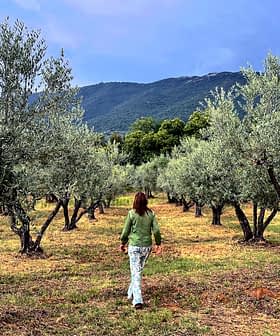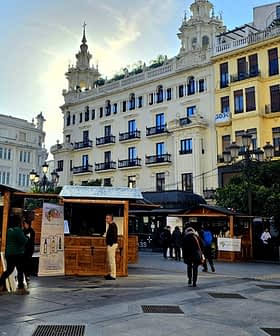Masía El Altet: Valencia's Gold Standard
At nearly 3,000 ft above sea level in Valencia, Masía El Altet is placed at the turning point where the Mediterranean climate starts receiving continental influences.
 Jorge Petit Jr. and Jorge Petit Sr. at Masia El Altet
Jorge Petit Jr. and Jorge Petit Sr. at Masia El Altet For centuries, the Sierra de Mariola has been regarded as a kind of natural botanical garden at the heart of the Valencian Community, in Eastern Spain.
Over 1,200 species of plants, many of them endemic, grow on its slopes and aromatic and medicinal herbs are the base of herber (meaning “made of herbs”) — a local liquor which is probably one of the best-known products of the area.
I was born in the countryside. I’ve been raised here. And I have really seen these olive trees grow as if they were my brothers
No wonder Jorge Petit and his father, also named Jorge, credits the pines, rosemary and thyme for the flavor of their olive oil.
“This is very important because olives, being fat-soluble, feed themselves and absorb all that there’s around them. If there was a factory here, they would absorb smoke. But we have aromatic plants,” Petit said at his estate at Masía El Altet, where he and his father met a reporter and videographer on assignment for Olive Oil Times.
Their ivy-covered 17th-century mansion is placed in the middle of a grove of 14,500 olive trees. The tall cypresses around the house and its pale orange façade give it a Tuscan look.
“I was born in the countryside. I’ve been raised here. And I have really seen these olive trees grow as if they were my brothers,” Petit pointed out.
This 73-hectare plantation is set in a small valley some 10 kilometers from Alcoi, the main town in the area, and is shared by two natural parks.
To the North, the Sierra de Mariola. To the South, the Font Roja Natural Park, one of the main kermes oak forest reserves in the Valencian region.
“We started planting olive trees back in 1992. Before that, sunflowers and wheat were the main crops here. We were looking to grow fruit trees but they suffered too much from frost.
Then we noticed that our hundred-year-old olive trees performed very well here. And we decided to plant more olive trees. Before that, all the oil we produced was for our own consumption,” Petit explained, as he strolled with his father through the trees.
Being in a protected natural area has certain advantages, but it also brings some limitations. For instance, the oil mill had to be built a few kilometers away, out of the parks.
In 2003, they started selling their own oil. Just six years later, the renowned French chef Joël Robuchon — who used to spend his holidays in a nearby town — started using it at his restaurants.
“We were slowly growing, but from 2009 on, our growth was exponential. I think [Robuchon] fell in love with our oil because of the complexity it has. And that’s thanks to the climate of the place we grow our olive trees,” Petit said.
The Alicante Mountains have traditionally produced olive oil as almost every region around the Mediterranean. But this area is far away from Spain’s main producing areas, such as Jaén or Córdoba.
In fact, Masía El Altet was the only award-winning producer from the Valencian Community at the 2018 NYIOOC World Olive Oil Competition, where it won three Gold Awards. This distance to Andalusia may contribute to the particular traits of Petit’s oils.
This is a land of contrasts. Just a few kilometers away from the coast, the mountain range — which reaches almost (around 4,593 ft) of altitude — is covered by snow every winter.
At 850 meters (2,788 ft) above sea level, the limit of height where olive trees can grow in the area, Masía El Altet is placed at the turning point where the Mediterranean climate starts receiving continental influences. And thermal differences may be abrupt.
“We have 22°C (72°F) now. Last night we had around 13°C (55°F) and by noon we’ll be over 30°C (86°F),” said Petit.
“This wide thermal contrast, sudden day-night changes are really important for the final quality of the olive,” he added.
Apart from the climate, Petit describes the use of local varieties as Masía El Altet’s “distinguishing trait.”
Most of the newly planted olive trees of the estate are of Picual variety. However, the centenary trees that survive in the terraced fields belong to four local cultivars: Alfafarenca, Genovesa, Blanqueta and Changlot Real.
“They produce oils that are a little bit sour and spicy. So we mix them, we make a coupage, in the quest of a more balanced oil,” he said.














